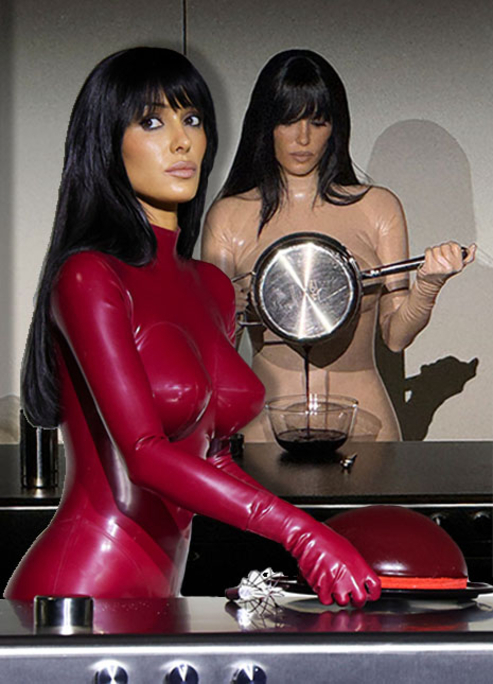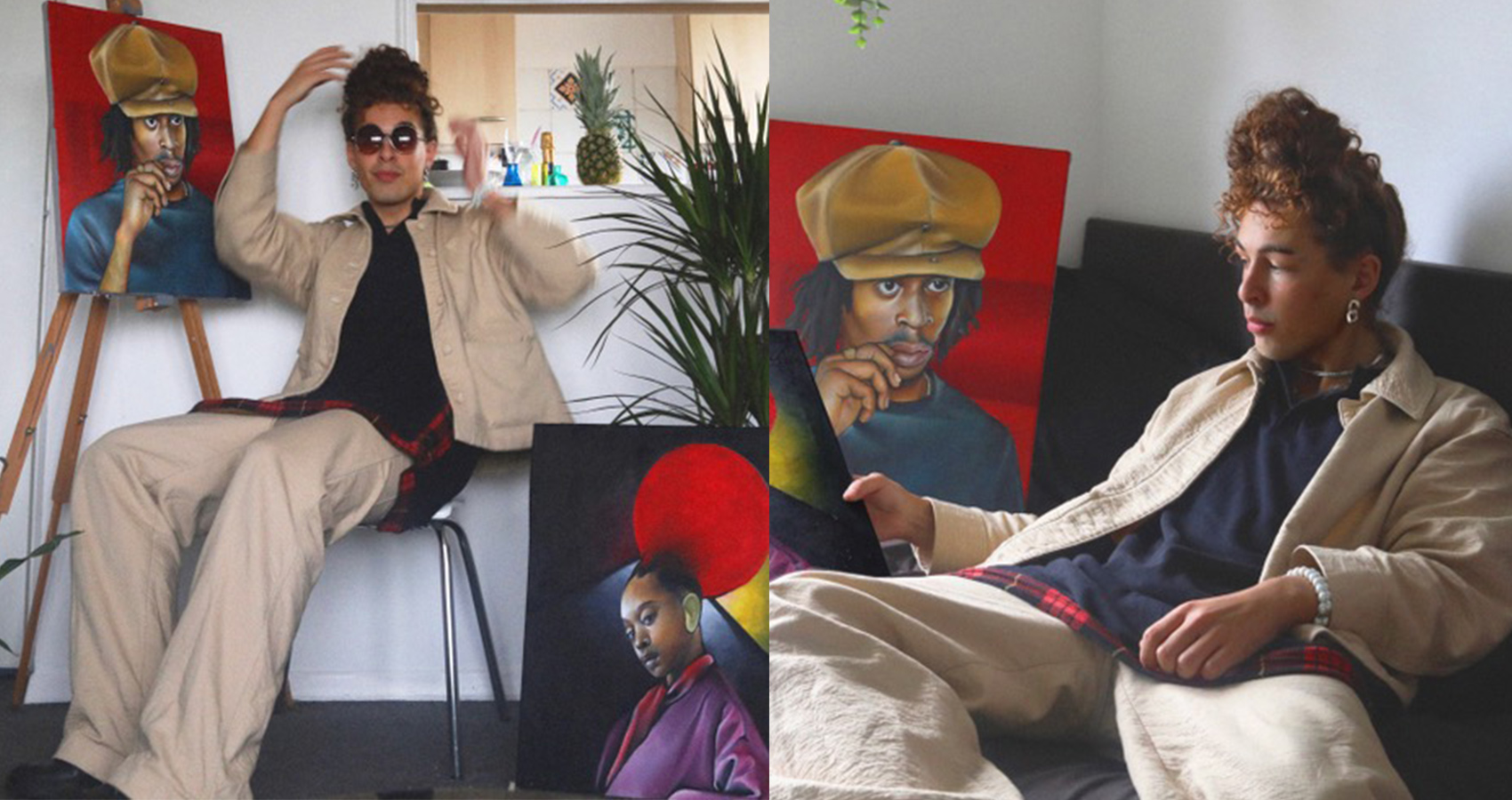
Sam Wootton Is The Oil Painter Reworking Everything You Thought You Knew About Art
We talk breaking out of moulds, the importance of representation and conservative clownery.
After graduating from King’s College London and beginning to work with Dover Street Market, Sam Wootton continues to showcase his insanely unique creative flair through a series of alluring works. As a model and radio presenter for JuiceBox Radio, with experience in styling and journalism, the London-based creative exhibits his boundless talents throughout multiple avenues, cementing himself as one to watch. Infusing both classical and contemporary features into his work, the proficient painter is storming the art world with an authenticity impossible to ignore. Who you know comin’ like this?
What were your first experiences with art and how have they shaped your work?
One of my earliest memories in regards to art was sitting on my grandma’s floor with her, drawing monsters. She passed unfortunately when I was a kid, so I didn’t know her too well, but she inspired creativity within me from a really young age. As I continued doing art and carried on in a creative direction, I set boundaries on myself and boxed myself in. My first styles were anime and manga based, then I went onto more comic book styles. Only recently I’ve been like I don’t need to link myself to these specific practices, and that goes back to drawing on the floor with my gran and literally just drawing whatever came to my head. There is so much to be said for spontaneity and expressionism. You don’t need to limit yourself with your creative processes.
How does your creative process translate from idea to execution?
Up until this point, and I say this point because I’m undergoing an internal artistic renaissance with my ideas going in a different direction, my processes have been synonymous. Idea and execution came all in one. I work alla prima, an Italian phrase meaning wet on wet. I don’t do layers, I just paint into wet paint which informs the way in which I work because it’s not necessarily thought out. It’s a spontaneous process. The idea comes conceptually in my head; I don’t do too much to it. I draw up the subject, and work with what I see. I don’t have a plan of action, I work with wet paint, start in one spot and work outwards. I don’t know how much that shatters the illusion in regards to artistic romanticism, that’s just how I work.
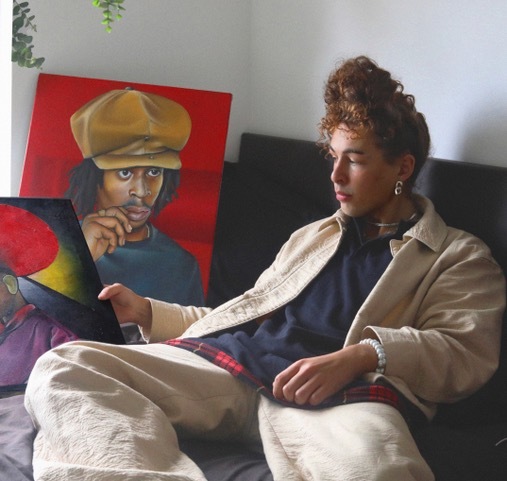
You’re blowing up on TikTok right now. What is it about documenting creativity in this way that makes it so engaging?
I’m a huge believer in a brand. I’m one of the most anti-capitalist people you’re going to meet, but when it comes to subconsciously adopting ideas with capitalism and my art, it just happens. A lot of my fave musicians are brands in themselves. Playboi Carti and Lancey Foux for example, a lot of new age rappers do it. It’s not a conventional singular practice, it expands and moves onto fashion, music, art. It moves onto all these things and TikTok speaks to that. It’s a way in which all these creative practices can be documented in a neat format. On a pragmatic level, this resonates with people in our age group more than viewing a still image on an Insta feed, especially when it comes to my paintings.
When producing artwork, do vulnerability and boldness become mutually exclusive? Or can they co-exist?
I think they can co-exist. I think through my artistic practice, I am both vulnerable and bold in the sense that offering any form of art into the world is going to open up avenue for critique. Because art as a medium is inherently so closely tied to the individual and because of who I am as a person, I think the critique can hurt. Art is me and I am art, any critique therefore hits me on a deeper level. And then the boldness, which I affiliate with confidence, comes off the back of that. The boldness comes in hearing people talk shit about your art, hitting you with constructive criticism and taking it on not as objective truth, but as perspective. The art world has gatekept the way which in which we view art for centuries. The conventional standard of going to a gallery needs to be shattered. Everyone should have an opinion that doesn’t need to be founded in standardised education. Every critique is valuable and vulnerability is A1 because you need it to create art.
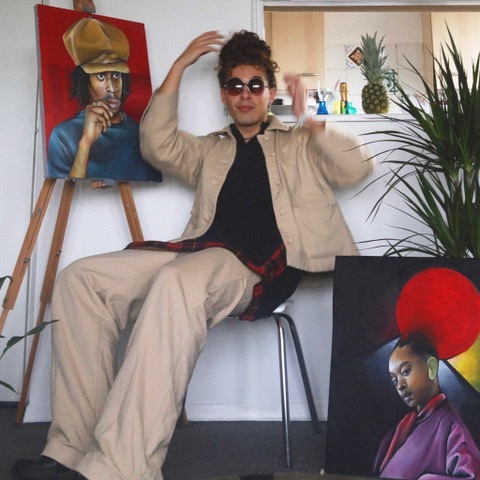
Is art for the artist or for the audience?
This is a question that hits home for me. Admittedly for a lot of my life, my practice has been for the audience, that’s why I gravitated towards a more realist style. If you look at my sketchbooks, it’s far more abstract and far more expressionist, it’s more of a reflection of how I’m feeling. Whereas with my paintings, I gravitate towards regimented and strict styles, which shows a craft. But this idea of the craft is founded inherently in colonial conceptions of what it is to be an artist. I’m against the whole idea of a canon when it comes to art, but it translates into my work so it’s a bit of a dichotomy. For the majority of my life, my art has been for the audience because I’ve felt like I needed to prove myself. More recently I’ve been painting for me and taking spontaneous decision. It’s killed me because I’ve had to deconstruct the artistic practice I’ve been accustomed to for the entirety of my life. But that’s fine, we move, it’s all part of progression. I’ve been incorporating spontaneous elements to evoke how I’m feeling, and that’s not to say my realist practice up until this point has been null and void and hasn’t had any input from me, it has and it very much shows me as a person. It shows my thinking process and the way in which I perceive world. But now I’m tapping in to a more emotive side of those things and trying to translate more of a feeling rather than an objective. I’d like it to be a balance of viewer and me, but I’m pulling it away from the viewer and more on me.
How does it feel to receive recognition from those that have inspired you i.e. Michael Ward, Malik Roberts etc.?
I think it’s hugely validating. In terms of my art, it’s oil painting and it’s quite classically inspired. There isn’t that much representation, which is why subject matter is so important for me. Michael Ward for example, and musicians like Lancey Foux, Keyah Blue, Goya Gambani, all these people are artists I look up to, but they’re artists in the sense of being multi-disciplinary, and I think that representation really matters. Having sort of a co-sign from someone whose art you respect is hugely valuable and hugely affirming to the work, because you have put so many hours into it. It’s so nice to be recognised by someone who’s medium isn’t necessarily art. It’s definitely different getting affirmation from someone who isn’t a traditional artist than from someone who has practiced the arts or even studied art. In a sense I find it more affirming because it appeals to the inner democrat within me. Not to say I’m not a democrat, I very much believe in democracy, sorry to get into politics. But yeah, I do like to appeal to people, and hearing positive feedback from someone I look up to is golden. I love it.
The British government have made it clear they have no desire to support the arts. How do you feel about aspiring creatives being deterred from their passions as a result of this?
It’s always fuck the conservatives. From my stance anyway. I felt like it was satire when I first saw the roll out of the infographic about retraining in cyber. I just think it’s hugely ironic the way in which they pushed this idea. They relied on infographics, adverts, photo-shoots. They relied on government money to fund these photo shoots, to get a stylist, a lighting person, the model themself, to buy the space which is often creatively owned. They’re pushing this idea that is inherently reflective. And I know it’s the idea that you live in a capitalist society so therefore you can’t engage in capitalist stuff, I know that’s the idea I’m pushing now, but I don’t think it’s too outrageous in this instance. If you’re gonna tell people not to do anything creative, don’t push it out in a fucking advertising campaign. Be authoritarian about it or something, if you’re gonna be that insidious just be overly insidious so everyone can hate you even more. The conservative government is so slimy in the way it goes about things. I can’t condemn the message more. Creativity is the lifeblood of our society. What would anyone have done without forms of media in lockdown? But this is speaking from a very privileged position. During lockdown I was at home entertaining myself and doing my studies, but it really drove home the importance of creative outlets. It’s nourishment for the soul and it captures culture so well, in a way that maybe cyber couldn’t do. Cyber is great and studying more standardised fields is great, if that’s your ting then gravitate towards it. But I don’t think the government is in position to be dictating who should be studying what and where. I think it’s a really almost Stalin-ist move.
Who has been your favourite guest to interview on JuiceBox Radio?
It’s probably Nega Brandon, or BBNO$. BB was the first interviewee we had on, we were really just thrown into the deep end. We had just established the station and now we had a platinum-selling international artist on the show. We were just trying to find our feet. It wasn’t an interview as much as it was a conversation. Going from that, he said it was the best interview he’d had overseas. So we were like shit okay, maybe we’re onto something. Maybe this conversational style we had that we thought was poor interviewing isn’t actually poor interviewing, and that conceptions of being an interviewer on a show don’t necessarily need to be to extract conscious information from people. You can extract subconscious information like mannerisms, ideas, ethics, moral codes, which come across through regular daily conversation. I think these are equally as valuable as regimented questions. Nega Brandon who we had on one of our latest shows, we’re friends, I used to work with him. His music is A1, he’s an incredible musician doing incredible stuff right now, I can’t recommend his work more. It was nice to have a chat with him, nice to be in the studio, have a few drinks, get a bit yakked. It’s always fun to have friends in the studio.
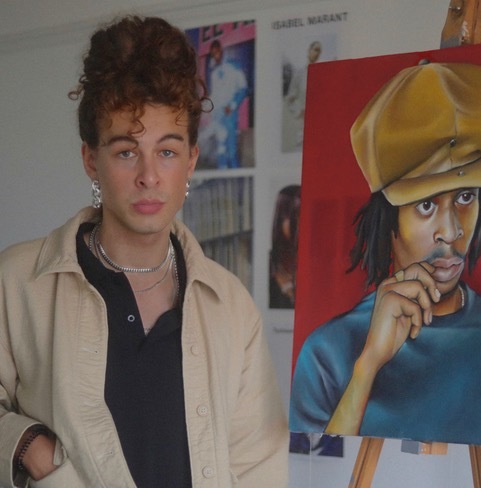
What do you want your work to say? How do you keep this constant throughout a piece?
This is a question I haven’t necessarily pondered for a lot of my life. My stuff with a message often screams the message. A piece I did for men’s mental health, which was published in Hélène Selam Kleih’s book HIM + HIS, focused on the domesticized male and how toxic masculinity is passed on in the home through its context and through the piece itself. While a piece I did about a man I saw unfortunately commit suicide on Waterloo Bridge invoked his memory and pushed the idea of seeking help. The pieces I have with ideas pushed behind them, the ideas come to the fore. I’m trying to bring more conceptual practices into my work more consciously and cognitively. My work generally can be quite a subconscious process where I’m not necessarily breaking it down as I go along, where the plans aren’t necessarily there.
I don’t know how much that’s contributed to my ADHD or me as a person or who I am. But ideas that I have are often subconscious. I am incredibly privileged to be able to make art from that space, and that I’m not making art for survival or off the back of living in an authoritarian system, or not off the back of making art from being overtly oppressed. In that sense, my art is privileged art. It’s not coming from a place of struggle, more so from a place of capturing who I am. Not to say that they’re mutually exclusive, but I think that’s where my art comes from and I think I would be silly not to recognise that and therefore not to be an advocate for artists using their art as a method by which to make an active social comment or to get out of a system that doesn’t necessarily serve them.



